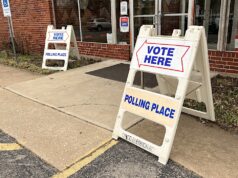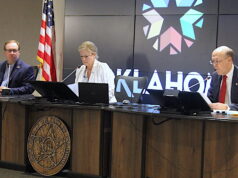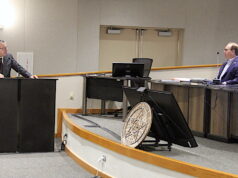If at first you don’t succeed, try, try again.
In the matter of one bribery case, Oklahoma Corporation Commission chairman Bob Anthony has been seeking justice for more than two decades.
Tuesday, Anthony and his fellow commissioners convened in a courtroom of the Jim Thorpe Building to hear motions for and against the commission re-opening a 25-year-old telecommunications rate case that was marred by corruption.
As NonDoc outlined last week, Public Utilities Docket 260 concerns a windfall of cash granted to AT&T (then Southwestern Bell) in 1989 after cuts to the federal corporate tax rate. Anthony was integral in exposing how one of the corporation commissioners who voted to grant the telecom giant that money had been bribed by an attorney for Southwestern Bell. As such, the vote is invalid under the Oklahoma Constitution, but Oklahoma’s Office of the Attorney General has resisted attempts to re-open the case over the years.
Depending on how one accounts for it, upwards of $16 billion could be on the table in the form of refunds to Oklahomans.
Arguments against re-opening PUD 260
Long-time Southwestern Bell attorney Curt Long opened Tuesday’s discussion, calling PUD 260 a “frivolous case.”
“The 1988 Bell rate case is closed,” he said. “It has been closed for 20 years. You have no jurisdiction to re-open it, you have no jurisdiction to vacate the 1989 rate order … and you have no jurisdiction to order a refund.”
Long then went on to outline reasons why the OCC lacked jurisdiction on the case, adding that any one of those reasons would be sufficient to dismiss the case with prejudice.
He cited a 1991 decision from the Oklahoma Supreme Court and the Oklahoma Corporation Commission’s decision in a 1997 case as evidence to support his argument.
Follow NonDoc:
“The notion that there are billions of dollars to be passed down to rate payers is simply delusional,” Long said.
He also cited a 1967 case with the purpose of supporting his argument that, because the PUD 260 vote was essentially a legislative act and not a judicial act, the bribed vote should count.
Abby Dillsaver, assistant deputy attorney general, echoed Long’s arguments. She repeated the phrase, “Yet, here we are again,” to emphasize Attorney General Scott Pruitt’s position that this matter has been decided several times before, and the OCC lacks jurisdiction to modify or amend previous Oklahoma Supreme Court rulings.
Although Dillsaver did note the AG’s office had other grounds for dismissing a return to PUD 260, she said they would wait until the OCC had voted on whether or not it had jurisdiction.
Applicants’ case for re-opening PUD 260
In an introduction to the applicants’ case for re-opening PUD 260 that drew audible groans, attorney Andrew Waldron took those in attendance on a journey through history’s most infamous killers (Hitler, Stalin, McVeigh, etc.) and corporate crooks (Enron, Tyco, WorldCom).
Waldron was attempting to lay the foundation for his argument that AT&T’s corruption in this case, in dollars and on a percentage basis, is far worse than those corporations’ ill-gotten gains and should induce the same kind of visceral abjection akin to the naming of historical villains.
Citing a 1996 brief from the AG’s own office, Waldron eventually got to his fundamental argument.
“When you obtain a vote by bribery, bribery doesn’t count,” he said. “The (PUD) 260 matter was not constitutionally decided.”
Public denied opportunity to comment
Although the Oklahoma Corporation Commission docket posted Oct. 16 stated, “All interested parties may appear and be heard” at Tuesday’s special meeting, the public was actually denied that privilege.
“This is the first public utility case that I think I’ve ever heard of [where] the public is not allowed to make comment,” Anthony said.
The reason for this public muting concerned the nature of the meeting, which was listed as an “Initial Screening Conference” on the OCC’s docket. According to Michele Craig, general counsel for the OCC, the special meeting was actually a series of “motions for legal arguments.”
“It’s my instinctive nature to allow public comment, and it’s very difficult for me to speak otherwise, but I do not think it’s proper at this point,” said Commissioner Todd Hiett. “I was hoping today to hear more from the applicants about the jurisdiction question.”
Comments from the players
Chairman Anthony expressed some dismay with the cases made against re-opening PUD 260.
“It’s discouraging that justice seems not to have been done, and some arguments saying this is legislative — so bribery of a commissioner doesn’t have as strong an enforcement — that’s a questionable argument of law,” he said.
Sody Clements, a councilwoman for Nichols Hills and a member of the six-person team of applicants trying to get PUD 260 re-opened, said the meeting was frustrating.
“They’re not talking about the merits of the case, they’re still just nitpicking over legalities,” she said, prefacing her comment with the admission she was not an attorney. In 1988, Clements worked to get Anthony elected to the OCC, and the two have remained friends.
Waldron said it seemed like the opposition was trying to throw the Supreme Court under the bus.
“The one thing that I was very happy to hear, and I think it was the first time we’ve heard it in a clear way, was that, ‘It’s all the Supreme Court’s fault,'” he said.
When questioned for her thoughts, Dillsaver referred comment to Pruitt spokesman Aaron Cooper.
Next steps in the case involve the OCC holding a vote to determine its jurisdiction — essentially whether the matter is judicial or legislative.
No date was set for the next hearing.





















